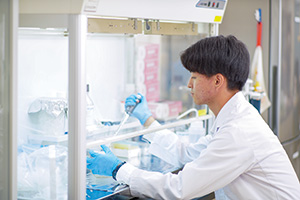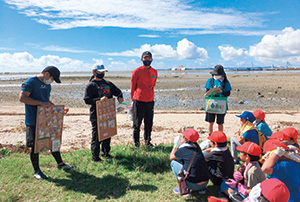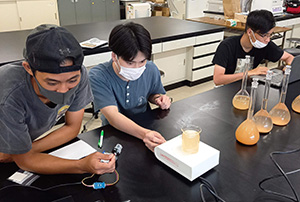Department of Regional Economics and Environmental Policy
画像ギャラリー
Let’s examine the local community and environment from an economic perspective! If you love Okinawa, come join us!
The Department of Regional Economics and Environmental Policy combines the study of regional economics, which explores local economic issues, with environmental policy, which strives to craft policies that create environmental standards desirable for human society. The department aims to train professionals who can contribute to society through their deep understanding of environmental conservation and resource use based on economics.
People tend to see environmental problems as concerns for natural science, but the real cause of these problems is the strain placed on the environment by modern lifestyles, characterized by mass production, mass consumption, and massive amounts of waste. For this reason, most environmental problems are caused by economic activity. Consequently, approaching such problems through a fusion of regional economics and environmental policy can be extremely beneficial.
The department’s stated goal is “to train insightful specialists who can contribute to the creation of a recycling-oriented community that can achieve sustainable growth as a diverse modern society in the twenty-first century.” With this goal in mind, the department offers a rich educational program that meets the local community’s needs. Students will deepen their understanding of regional economics and environmental policy by learning about the local economy, culture, history, and natural environment and examining the immediate surroundings.
Department Characteristics
The department provides a diverse curriculum based on economics and many subjects relating to the environment.
The Department of Regional Economics and Environmental Policy combines the study of regional economics, which explores local economic issues, with environmental policy, which strives to craft policies that create environmental standards desirable for human society. The department aims to train professionals who can contribute to society through their deep understanding of environmental conservation and resource use based on economics.
People tend to see environmental problems as concerns for natural science, but the real cause of these problems is the strain placed on the environment by modern lifestyles, characterized by mass production, mass consumption, and massive amounts of waste. For this reason, most environmental problems are caused by economic activity. Consequently, approaching such problems through a fusion of regional economics and environmental policy can be extremely beneficial.
The department’s stated goal is “to train insightful specialists who can contribute to the creation of a recycling-oriented community that can achieve sustainable growth as a diverse modern society in the twenty-first century.” With this goal in mind, the department offers a rich educational program that meets the local community’s needs. Students will deepen their understanding of regional economics and environmental policy by learning about the local economy, culture, history, and natural environment and examining the immediate surroundings.
Department Characteristics
The department provides a diverse curriculum based on economics and many subjects relating to the environment.
- Explore career options through free and flexible subject selection.
- Learn about environmental issues and the latest economic trends in Okinawa, Japan, and the world.
- Study basic economic theory, application, and practice through a systematically organized curriculum.
- Develop broad and deep perspectives on regional and environmental economics.
- Take practical subjects dealing with globalization and changes in information technology.
- Take subjects to acquire various licenses and certificates.
- Learn theories and practices that improve the environment through economic activities.
- The department’s education and research have been enriched through collaboration with the Graduate School of Regional Business and Economics.
Admission Policy(Acceptance of New Students)
The Department of Regional Economics and Environmental Policy aims to train professionals who can contribute to developing regional economies while considering the environment and helping to create a sustainable society through an economic consideration of local communities and the environment. The department, therefore, seeks applicants who can explain in their own words how they possess the following characteristics:
- A broad interest in economic and environmental problems and solutions related to Okinawa and the world.
- An interest in Okinawa’s past, present, and future and a passion to contribute to the local community.
- An interest in what takes place in society and an ability to enjoy being active in the field.
- Basic academic ability needed to take university classes and a desire to study hard.
Curriculum Summary
Students take the required subjects of Regional Economics I and II and Environmental Economics I and II to learn about economic solutions to local economic and environmental problems. By taking specialized elective subjects, students deepen their knowledge of Okinawa’s economic and environmental concerns and acquire the ability to contribute to the local community. In their junior year, students choose seminars that match their interests. In their senior year, they write graduation theses summarizing the results of their investigations and research. Through this curriculum, students acquire a wide range of knowledge and culture.
| National Government | Local Government | Junior High or High School Teacher | Energy-related Work |
| Construction and Real Estate | Graduate School | Environment and Recycling | Museum Curator |
| Tourism and Eco-tourism | Japan Overseas Cooperation Volunteer | Finance and Insurance | Private Enterprises |



